New Italian law protects unaccompanied migrant and refugee children

A new law has been passed in Italy, aiming to guarantee the rights of unaccompanied children and provide a standard procedure.
The “Provision of Protection Measures” passed with an overwhelming majority of support in Italian parliament on March 28, with 375 yes votes and 13 no. It is the result of two years of intense lobbying by organisations focusing on Children’s rights in Italy, and complements the existing Italian Legislative Decree no.25/2008 which explicitly prohibits the detention of unaccompanied minors in accordance with international and European Union law.
IDC Member, Leonardo Cavaliere from Minori Stranieri Non Accompagnati, has provided a detailed analysis of what the new law will mean to those children who leave their homes, without a family member or guardian:
“The new law is particularly focused on: Age assessment and identification of Unaccompanied Minors; establish a structured national reception system, with minimum standards in all reception facilities; attention to the best interests of the child; education and health rights; the right to be heard in administrative and judicial proceedings about unaccompanied minors, even in absence of a guardian, and legal assistance”
To read more about Leonardo’s comments on the new Zampa law click here. Two years ago, Leonardo co – authored this analysis of the situation of child detention in Italy with with Luigi Di Leone, which at the time called for an urgent need for protection of migrant children.

Leonardo Cavaliere from Minori Stranieri Non Accompagnati , a member of the IDC network, has analysed the new law. Any questions contact: [email protected]
The UNICEF Regional Director and Special Coordinator for the Refugee and Migrant Crisis in Europe, Afshan Khan mentioned:
“While across Europe we have seen fences going up, children detained and pledges unmet, the Italian parliamentarians have shown their compassion and duty to young refugees and migrants,”.
The Zampa law also includes an additional 600 million euro in its budget to communities and services that assist with migrants and refugees.
What do these law changes mean for migrant and refugee children in Italy?
There are a number of positive practices that this law enables, focusing on collaboration and engagement rather than enforcement for these children. Unicef and the European Council Refugees and Exiles have both commended the law changes, indicating that they have the potential to be used in other countries in Europe.
Children can only be held in for 30 days, a reduction from 60 days, with a maximum of 10 days used to be identified and have their age verified.
Several professional will be provided to the children including a cultural mediator, a psychologist, a legal advisor and a temporary “volunteer guardian”. The “volunteer guardians” will be trained by regional officials for children and adolescents. Each minor is guaranteed to have a representative adult figure with a list to be created within three months. The cultural mediator will ensure that the minors will be aware of all the steps required in an asylum process, including the possibility of appeals.
A “Social Folder – Cartella Sociale” will also be established to provide a database to manage the location of unaccompanied minors, allowing help operators to use the folder to identify the specific needs of the child to create long-term solutions for them.
Access to the National Healthcare Service (SSN) will be available before being appointed a guardian and special agreements for apprenticeships and compulsory schooling will be available and subsidized for these children.
The IDC has developed a child – sensitive community and placement model (C-CAP) that outlines key considerations for children on the move. Read about the model here.
The Italian Context
A UNICEF report “Child Alert: A Deadly Journey for Children”, outlines the dangers that refugee and migrant children are exposed to en route to Italy, often at the hands of smugglers. Women and children are at risk of abuse, detention and sexual violence among the many risks associated with their migration through the Mediterranean, which has become one of the more popular routes from North Africa.
UNICEF has welcomed the decision by the Italian Parliament as it will “boost support and protection for the record number of foreign unaccompanied and separated children who arrive in Italy”. There is a current trend where the number of children arriving in Europe, especially in the Mediterranean is increasing with 2000 children alone arriving in January and February this year according to UNICEF.
Read more:
ECRE, 2017, ‘Italy developing Europe’s most elaborate system for protecting refugee children’, http://www.ecre.org/italy-developing-europes-most-elaborate-system-for-protecting-refugee-children/
UNICEF, 2017, ‘UNICEF hails new Italian law to protect unaccompanied refugee and migrant children as model for Europe’, https://www.unicef.org/media/media_95485.html?utm_source=ECRE+Newsletters&utm_campaign=7ef417da6b-EMAIL_CAMPAIGN_2017_04_07&utm_medium=email&utm_term=0_3ec9497afd-7ef417da6b-420551781
IDC Member Leonardo Cavaliere Talks Italian Migrant Children Laws
IDC Member, Leonardo Cavaliere from Minori Stranieri Non Accompagnati, has provided a detailed analysis of what the new laws will mean to those children who leave their homes, without a family member or guardian. Read his comments below.
On March 28, 2017, after nearly 4 years, the Italian Parliament passed new (Zampa) law for “Provision of Protection measures”. This law reform and systemize the welcoming system of unaccompanied refugee children. The bill was passed with 375 yes votes and 13 no. The new law aims to bring order and to advance, in terms of a guarantee of rights, a standard for the treatment of unaccompanied minors on our territory. The new law is particularly focused on: Age assessment and identification of Unaccompanied Minors; establish a structured national reception system, with minimum standards in all reception facilities; attention to the best interests of the child; education and health rights; the right to be heard in administrative and judicial proceedings about unaccompanied minors, even in absence of a guardian, and legal assistance.
What changes with the new law on unaccompanied minors?
The first significant change is that the law is focused on unaccompanied minors (as defined by article 2 of the law), recognized as children and teenagers, holders of the same rights of minors equal to those of Italian and European minors, precisely because of their vulnerable condition.
Art. 3 of the new law introduces an “absolute prohibition of refoulement”, unlike the previous article 19 of the Consolidation Act of immigration that considered this possibility only depending on the individual personal circumstance, duly assessment.
This law aims to solve some practical problems of the reception system. As a solution to minors escaping from the first reception facilities, the permanency timing in these structures has been reduced from 60 days to 30 days. In this phase, in a maximum of 10 days the minor will be identified and his age verified. Also in this crucial phase, with the presence of a cultural mediator, the minor will be guaranteed a meeting with a development age psychologist. After this, unaccompanied minors will be collocated in the SPRAR (Protection System for Refugees and Asylum Seekers) present throughout Italy.
“These structures, as specified by the new law, must be intended only for minors”
Art. 5 regulates the identification procedure for minors in Italy. From now, all measure concerning foreign unaccompanied and separated children must be notified to the minor and his temporary guardian is mandatory, ensuring the possibility of appeal. In the identification phase the cultural mediators presence is expected, and will follow the proceedings, so that the minor will be aware of all the steps. Art. 9 establishes a national monitoring system on unaccompanied minors that includes the “Cartella Sociale”, a database to manage the location of unaccompanied minors according to the specific needs of children identified through the establishment of “social folder” that will help operators in contact with the child to know him better and to identify for him the best long-term solution.
Articles 6 and 8 introduce changes in family investigations and assisted repatriations. Today the family investigations are managed by IOM (International Organization for Migration), while assisted repatriations are handled by the General Department for Immigration at the Juvenile Court, which is the competent body that assesses what is in the best interest of the child.
Within three months, a list of “volunteer guardians” must be compiled to ensure that each minor has a representative adult figure. The volunteer guardians will be adequately selected and trained by a regional official for childhood and adolescence. Art. 7 forces the local authorities to promote foster care, rather than the custody in the structures.
Only two kinds of residency permits are being implemented by this law: one for minors and one for family reasons that will replace permits for fostering, integration, and pending fostering requests, used by common practice or never used at all.
Articles 14 and 17 aim to safeguard the right to healthcare and education. It is now possible to register with SSN (the National Healthcare Service), even before being appointed a guardian. Regarding education, they will be encourage agreements for apprenticeships and specific measures for the fulfilment of compulsory schooling will be subsidized.
In all administrative and judicial steps, provisions have been introduced which give importance to the desires of the minor and the right to appoint a legal advisor, taking advantage of, in accordance with current legislation, free support at each stage of the process. Art. 17 establishes protection and guidance for unaccompanied minors that are victims of trafficking through a specific assistance program.
The institutions and the associations for the protection of the rights of foreigners, provided that they are registered with the Ministry of Labour and Welfare, may appeal against acts of the Public Administration that are considered being adopted in prejudice of the interests of the unaccompanied minors and may intervene into the proceedings that concern them.
For more information visit: http://minoristranierinonaccompagnati.blogspot.com.au/
Child Detention Monitoring Training for the Council of Europe Parliamentary Campaign

The IDC Advocacy Coordinator, Mr. Ben Lewis, presented as part of the pilot training seminar ‘Monitoring places where children are deprived of their liberty as a result of immigration procedures’ as part of the Parliamentary Campaign to End Immigration of Children (phase II).
The training seminar was held at the Council of Europe Palais de l’Europe in Strasbourg, from 11 April to 12 April 2017.
The training aimed to provide relevant information regarding standards and practical tools to participants, foster exchanges between MPs and Children’s Ombudspersons and promote their collaboration at national level.
Speakers included:
- Andrea Vonkeman, Policy and Legal Support Unit. UNHCR Bureau for Europe
- Ben Lewis, Advocacy Co-ordinator, International Detention Coalition
- Julien Attuil-Kayser, Children’s Rights Officer, DCI-Belgium
- Benoit Van Keirsbilck, Director, DCI-Belgium
Access the draft agenda here.
To find out more about the Council of Europe Parliamentary Campaign to End Immigration Detention of children, visit their website: http://website-pace.net/web/apce/children-in-detention
Save the Date : IDC Annual Member Meeting June 16
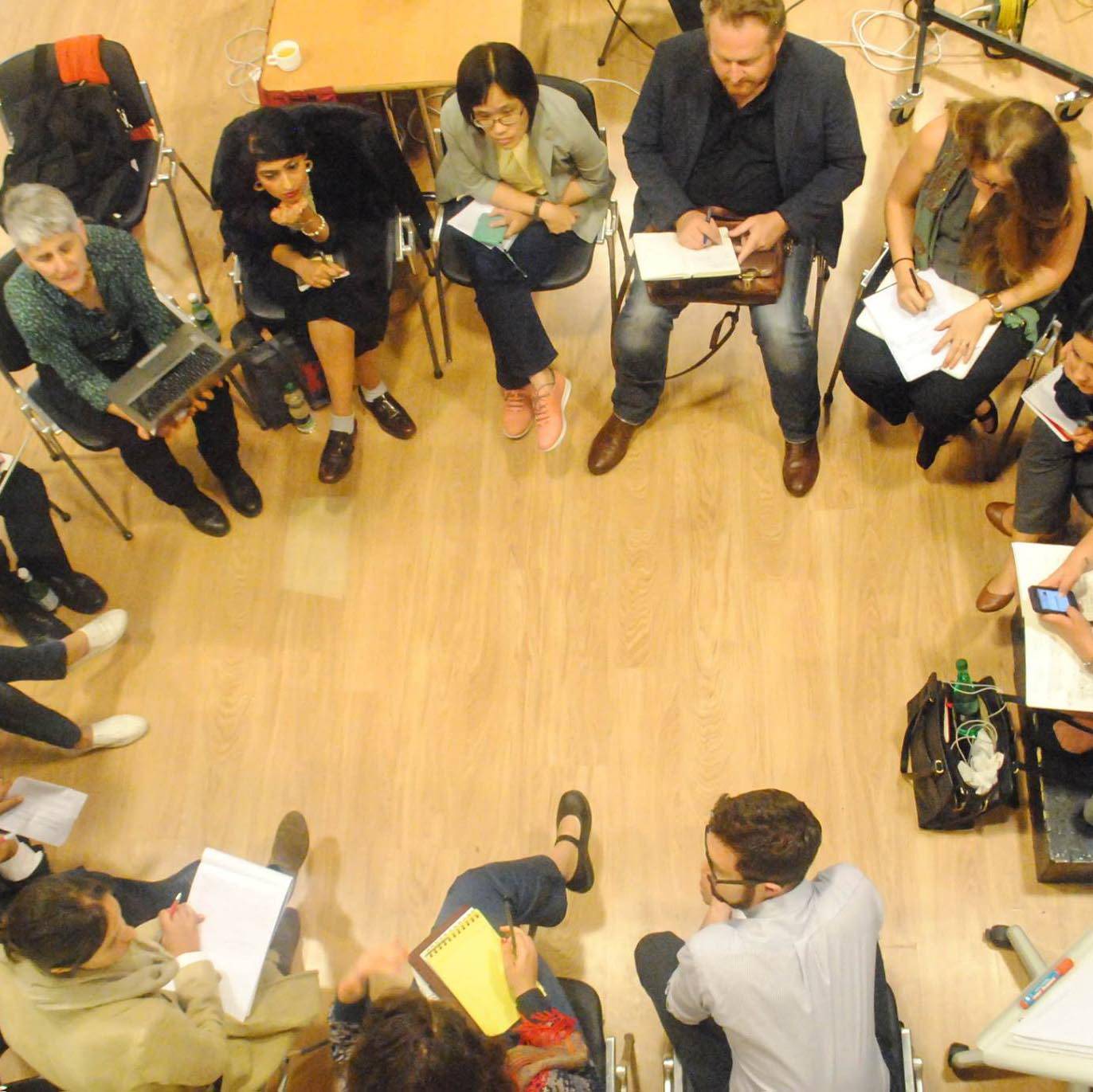
Members at the IDC Annual Member Meeting 2016
Our annual member meeting will be held at the International Conference Centre in Geneva on June 16 from 4.30 - 6.30 pm.
The meeting provides an excellent opportunity for members to share information and insight across the network. We will discuss four thematic areas which will help shape the work of the IDC in the year ahead.
This years meeting will be in the same building - and directly after - the annual UNHCR NGO Consultations.
All Members of the IDC are encouraged to fill out the short survey, available at the button below, by June 1 to inform the planing session.
Responses from the survey will be shared among IDC Members.
For those members who are unable to attend in person, a livestream of the member meeting will be available.
For more details, please contact [email protected]
Solutions for reducing detention
A new network of NGOs piloting alternatives in Europe
A new network of European NGOs aims to reduce immigration detention by showing governments what works better in practice: not just by talking about it, but by actually doing it. Set up at the end of March, the “European Alternatives to Detention (ATD) Network” links civil society organisations developing case management-based pilot projects in five European countries.
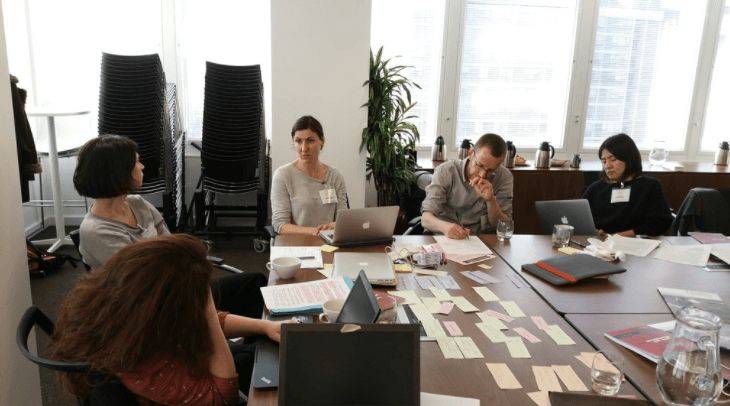
Each adapted to their own national context, these projects have one thing in common: they aim to demonstrate that detention is not necessary when migrants are supported and treated as human beings in the community. They are about showing, through practice, the kind of alternatives that can build migration governance systems which don’t rely on detention.
 “In Cyprus, we’ll be providing working examples of case management in the community as a way to advocate for the implementation of effective alternatives” explains network member Corina Drousitou of Future Worlds Centre, “this includes legal advice, social counselling, mediation with authorities, referrals to other organisations or services to cover their basic needs”.
“In Cyprus, we’ll be providing working examples of case management in the community as a way to advocate for the implementation of effective alternatives” explains network member Corina Drousitou of Future Worlds Centre, “this includes legal advice, social counselling, mediation with authorities, referrals to other organisations or services to cover their basic needs”.
Why do we need this network?
The problems with immigration detention are well known: it is extremely harmful, very expensive and also largely ineffective: detention actually reduces people’s motivation and ability to cooperate with immigration procedures.
There is also ample evidence that detention is not necessary: with support and engagement migrants can resolve their cases in the community. Engagement-based alternatives are highly effective, better respects rights and are much cheaper than detention – they provide the way to ensure detention is really used only as a last resort.
But few governments in Europe have developed effective alternatives, despite the obligation to pursue less coercive measures before applying detention. Now, with the increasing reliance on immigration detention in the region, the need for solution-based advocacy is stronger than ever.
“Talking about effective alternatives hasn’t been enough in Europe. That’s why we’re moving to the next level of solution-based advocacy: actually showing through the pilot projects in the network that this works” said Jem Stevens, IDC’s Europe Regional Coordinator.
What are engagement-based alternatives?
In Europe, discussions of ATD have focused on lists of restrictions or conditions placed on individuals (reporting, designated residence, bail etc). These often run parallel to detention and seek to control migrants through varying levels of coercion. But there is little evidence that they are effective in increasing compliance or case resolution. There is therefore a need to shift the focus to look at alternatives that actually work.
Engagement-based alternatives involve a very different approach. Instead of mistrusting and trying to police migrants, they use social work methodologies: providing tailored case management to support and empower migrants to explore all migration outcomes.
They work because, as IDC’s research shows, people are more likely to stay engaged and comply with immigration requirements, including negative decisions on their status, when they feel they have been through a fair process and can meet their basis welfare needs.
 “It’s achievable and doable to support people in the community instead of detention” said Tony McMahon, Detention Action’s Community Support Officer. Since 2014, he has been working with young migrant ex-offenders at risk of indefinite detention in the UK. “I see my job as helping clients to make the best decisions they can make, helping them to live in the community”, he explained. The project has achieved at least 90% compliance rate and is estimated to save between 83% and 95% of the costs of detention.
“It’s achievable and doable to support people in the community instead of detention” said Tony McMahon, Detention Action’s Community Support Officer. Since 2014, he has been working with young migrant ex-offenders at risk of indefinite detention in the UK. “I see my job as helping clients to make the best decisions they can make, helping them to live in the community”, he explained. The project has achieved at least 90% compliance rate and is estimated to save between 83% and 95% of the costs of detention.
What will the network aim to do?
The network brings together NGOs in the UK, Cyprus, Bulgaria, Poland and Belgium – each running or exploring pilot alternatives – with the IDC and PICUM, which will lead on advocacy at the EU-level. Through the network, members will support each other’s work and collectively build a knowledge and evidence base on how effective case management-based alternatives work in practice. The aim is to help and encourage NGOs, governments and the EU to start developing alternatives that can build systems which don’t assume a need to detain.
Members of the European ATD Network
- Centre for Legal Aid – Voice in Bulgaria
- Future Worlds Centre (Cyprus)
- Detention Action (UK)
- Association for Legal Intervention (SIP) (Poland)
- Platform Minors in Exile (Belgium)
- Flemish Refugee Action (Belgium)
- Platform for International Cooperation on Undocumented Migrants (PICUM)
- International Detention Coalition (IDC)
EPIM is funding a number of ATD pilot projects within the network.
Find out more
Network member Detentions Action’s report, Without Detention, highlights the opportunities for community-based alternatives to reduce the detention of migrants in the UK.
Newtwork member, Future Worlds Center, details their pilot alternative to detention project here
This article first appeared in the International Detention Monitor (April 2017) and was revised on 27 April 2017
Related Posts

Building trust, avoiding detention
What do we mean by case management as an alternative to detention? How can we engage clients to actively participate in the process? These were some of the questions considered by the case managers…
Piloting Alternatives to Immigration Detention in Cyprus
This article has been written by Josefina Mavrou, Researcher, Future Worlds Center
The use of detention is the default practice for the removal of third-country nationals, as well as a measure to control immigration in Cyprus. In addition, there are gaps in the legal framework and procedures related to the detention of third country nationals in Cyprus, including a failure to implement alternative measures.
Over the next two years, Future Worlds Centre will be implementing an innovative alternative to detention (ATD) pilot project, providing working examples of case management in the community as a way to advocate for the implementation of effective ATD based on the IDC’s Community Assessment and Placement (CAP) Model.
The Situation in Cyprus
Over the last three decades Cyprus has been implementing an austere immigration policy that has included the use of detention as the default practice for the removal of third-country nationals (TCN). Furthermore the lack of a migration policy, lack of any regularization procedures, status determination or policy/practice for persons who cannot be returned, has lead to persons being detained repeatedly or if not detained left in destitution.
Although the national law, in line with the relevant European Directive 2008/115/EΕ, states that detention should only be used as a last resort and when “less coercive measures to detention” are not possible, to date there are no clear procedures set in place to assess necessity and proportionality of detention. In addition, there is still no systematic review of the necessity of detention and actually no AtD are implemented in practice, regardless of this being required by Law. This often leads to vulnerable persons being detained, including victims of torture or trafficking. asylum seekers, persons who cannot be retained and who may have been detained repeatedly.
Moreover, the state is still considering the implementation of measures they consider to be alternatives to detention such as tagging. Whereas, the recent transposition of the recast Receptions Directive in October 2016 has increased the instances in which an asylum seeker can be detained; allows detention of asylum seekers based on administrative orders instead of judicial, with no maximum time-limit and no automatic review, all of which open the possibility of a rise in the number of asylum seekers in detention.
It is important to mention that there have seen some positive developments in the last two years, such as the de facto termination of the detention of unaccompanied children or mothers with young children
It is important to mention that there have seen some positive developments in the last two years, such as the de facto termination of the detention of unaccompanied children or mothers with young children, the reduction of instances in which asylum seekers can be detained, as well as reducing the period of time asylum seekers are in detention. Although these practices show an effort to improve the system, they have yet to become law or official policies.
In the last year and for the first time there has been systematic advocacy on the establishment of alternatives to detention in Cyprus. This has included initiatives by the Commissioner for Administration and Human Rights (Ombudsman), UNHCR Representation in Cyprus, Commissioner for the Rights of the Child, as well as NGO Future Worlds Center, both individually and in joint activities.
Promoting and Establishing Alternatives to Immigration Detention in Cyprus
From S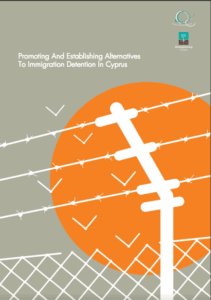 eptember 2015 to November 2016, Future Worlds Center implemented a Project on “Promoting and Establishing Alternatives to Immigration Detention in Cyprus”, in cooperation with the Commissioner for the Rights of the Child and UNHCR in Cyprus and with the support of the Office of the Commissioner for Administration and Human Rights (Ombudsman), and funded by the European Programme for Integration and Migration (EPIM).
eptember 2015 to November 2016, Future Worlds Center implemented a Project on “Promoting and Establishing Alternatives to Immigration Detention in Cyprus”, in cooperation with the Commissioner for the Rights of the Child and UNHCR in Cyprus and with the support of the Office of the Commissioner for Administration and Human Rights (Ombudsman), and funded by the European Programme for Integration and Migration (EPIM).
The knowledge and experience gained during the implementation of this Project suggest that there is a need to reform the existing framework in order to create an effective and functioning mechanism which will primarily safeguard the rights of third country nationals. The implementation of such mechanism will protect persons against the risk of arbitrary detention and will provide less strict but effective alternative measures through a specific process and clear criteria.
The experience of implementing such measures at an international and European level demonstrates that the Revised CAP Model and specifically, case management, leads to higher levels of compliance and case resolution. Furthermore, it has been shown that the detention of third country nationals does not prevent or reduce irregular entry or stay in the country, whiles the cost of detention, both financial and humanitarian is extremely high.
The examination of alternative measures does not suggest the complete abolition of the use of detention. On the contrary, the existence of a clear framework of alternative measures guarantees the legality of procedures and ensures that detention will only be applied as a last resort.
Through the implementation of the Project, we came to the overall conclusion that Cyprus has the potential to promote, support and establish an alternative framework, as well as develop good practices so as to become a good example not only in Europe but also at international level.
Based on the findings from the desk and field research, we propose:
- The immediate adoption and implementation of the revised Community Assessment and Placement (CAP) Model, adjusted to the Cypriot reality.
- The immediate adoption and implementation of alternative measures to detention which will be based on placing the person in a community setting, without conditions or with conditions or limited restrictions.
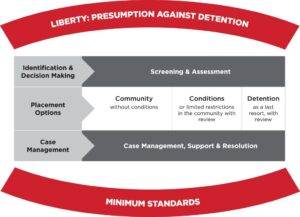
Pilot Alternative to Detention Project
Future Worlds Center’s pilot ATD project will implement the revised Community Assessment and Placement (CAP) model to provide case management in the community to asylum seekers, failed asylum seekers, irregular third country nationals and non-removables who are detained or at the risk of being detained.
Case management will include legal advice, social councelling, mediation with authorities, referrals to other organisations or services to cover their basic needs. Moreover, draft recommendations will be provided on each case, as well as updates where necessary and submitted to the authorities and alliances on each case. These will include recommendations on legal options, placement options, requirements to cover basic needs as well as recommendations for the resolution of the case.
The pilot programe will aim to show that by implementing the CAP model to engage with and support individuals in the community, government migration policy objectives can be met without using detention. This will be coupled with training low-level state officials (in departments responsible of deciding and executing detention orders and ATD as well as other related departments) and other NGOs and advocating at a policy making level for the adoption of the model.
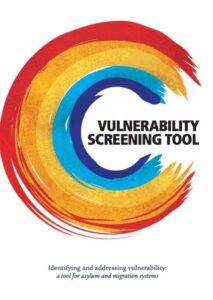 Training will be also offered on the Vulnerability Screening Tool produced by UNHCR and IDC, a tool designed to assist frontline workers, immigration officials and decision-makers to identify an individual’s areas of vulnerability and to refer them to appropriate support and placement options in the context of asylum and migration procedures and systems.
Training will be also offered on the Vulnerability Screening Tool produced by UNHCR and IDC, a tool designed to assist frontline workers, immigration officials and decision-makers to identify an individual’s areas of vulnerability and to refer them to appropriate support and placement options in the context of asylum and migration procedures and systems.
The implementation of a pilot program in Cyprus is an effective practice towards forming alternative measures. The pilot program, with the support of our alliances (Ombudsman’s Office, Commissioner for the Rights of the Child and UNHCR in Cyprus) and with the close collaboration of the International Detention Coalition, Detention Action (UK) and other Organizations, aims to highlight the effectiveness of individual assessment of cases, which leads to selecting the most suitable alternative measure and higher possibility of resolving the case.
--------------------------------
- Future Worlds Centre, Alternatives to Immigration Detention in Cyprus: A summary report in English (November 2016)
Resources from IDC Member Analyse Detention in Italy
The Italian government recently announced a significant expansion of the use of immigration detention, with plans to establish Identification and Expulsion Centres (CIE) in every region within Italy.
Our new Italian Members, the Italian Coalition for Civil Liberties and Rights (CILD) have provided a brief analysis and history on the failure of immigration detention and how disappointing and surprising that in 2017 discussions are still being held regarding the Identification and Expulsion Centres (CIE - Centri di identificazione e espulsione).
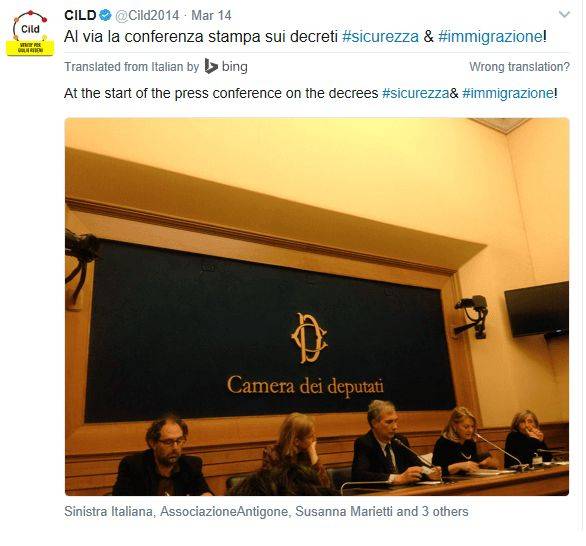 CILD highlighted the high costs, the criminalisation of migration and the inefficiency of immigration detention.
CILD highlighted the high costs, the criminalisation of migration and the inefficiency of immigration detention.
- For more information on the history of administrative detention and Identification and Expulsion Centres (CIE) and CILD's arguments against CIE's can be seen here.
- For more information on the shared document 'Constitutional, legal, social and cultural issues against the two decrees of the Government concerning immigration and security' click here.
- The Italian Coalition for Civil Liberties and Rights has also provided a statement to the Human Rights Committee on Italy detailing four priorities identified after their observations on Italy.
The International Detention Coalition (IDC) has expressed concerns over the Italian Government’s plans to expand the use of immigration detention, urging the use of alternatives to immigration detention to be utilised instead which have been shown to be more affordable effective and humane.
To find out more from our member CILD visit http://www.cilditalia.org/
Misguided and harmful: new European Commission policy on returns
The European Commission should focus on alternatives, not more immigration detention.
The IDC is deeply concerned that a new package on returns announced by the European Commission on 2 March is both misguided and harmful. The renewed action plan and set of recommendations seek to increase returns through enforcement-based measures including more and longer immigration detention. They have drawn widespread criticism from civil society organisations, and regional human rights bodies. .
Misguided policy
Under pressure from Member States to achieve quick results, the Commission has opted for short term policy measures which are not supported by evidence and are likely to be counterproductive and self-defeating. The punitive approach and end of process focus on forced returns is likely to decrease not increase cooperation and compliance with immigration decisions, as well as respect for human rights.
Detention is not the solution
For example, the recommendation mistakenly assumes that more and longer detention will assist returns, whereas evidence points to the opposite. In fact, international research finds that immigration detention discourages cooperation and decreases the motivation and ability of individuals to contribute to case resolution. The Commission itself has acknowledged that an “overly repressive system with systematic detention may also be inefficient, since the returnee has little incentive or encouragement to co-operate in the return procedure.”
Detention does not deter
According to Commissioner Avramopoulos, the policy further seeks to “send a strong signal against taking dangerous irregular journeys to the EU in the first place”. Describing the recommendation as a “slippery slope” a group of UN Experts pointed out, however, that “There is no empirical evidence that detention deters irregular migration or discourages persons from seeking asylum. Despite increasingly tough detention policies being introduced over the past 20 years around the world, the number of irregular arrivals has not decreased”. This is backed up by IDC’s own research, which finds detention is not only ineffective at reducing irregular migration to desired levels, but also weakens other migration management outcomes such as case resolution, departure for refused cases and integration for approved cases.
Subordinating rights to returns
Despite the numerous references in the package to being “fully compliant” with human rights, the proposals effectively subordinate human rights to the policy goal of increasing returns. The standards that are set in the proposals bring the level of safeguards to the absolute minimum and even encourage Member States with higher levels of protection (such as in the case of time limits on detention) to weaken them.
Child immigration detention
A key concern is that the recommendation discourages Member States to adopt laws and policies that would prohibit the practice of child immigration detention, and reinforces the view that States should continue to detain children and families “as a last resort” to effectuate returns “when no alternatives exist”.
This clearly goes against a growing body of international law that children should never be detained for migration reasons as it is never in their best interests. Furthermore, it directly contradicts guidance from the Council of Europe and the UN Committee on the Rights of the Child, who have called child immigration a clear child rights violation because there are always available alternatives to detaining children. Instead, they have urged States to “expeditiously and completely cease” the immigration detention of children and families.
EU governments seemed positively headed in this direction when they committed to work to end child immigration detention as part of the New York Declaration, adopted by the UN General Assembly on 19 September 2016. As UN and child rights organisations point out there are multiple other examples where the policy puts children at risk of harm.
The realities of immigration detention
The risk is that EU Member States will see the recommendation as a green light to use more immigration detention, including for children, with all the harm and suffering this entails. Although the policy makes reference to the principle of detention as a last resort, it ignores the reality that governments still frequently use to detention when it is unnecessary (because effective and more humane alternatives are available). Furthermore in some countries detention is clearly being used as a policy tool to criminalize and punish irregular migration, within the context of growing populism and xenophobic discourse in Europe and abroad.
Focus on alternatives not detention
As guardian of the EU Treaties, the Commission has a responsibility to uphold the highest standards and ensure the rights and dignity of all individuals regardless of migration status, in line with the Charter of Fundamental Rights. The Commission should develop sustainable policies which are proven to uphold EU standards including that immigration detention should only be used exceptionally and as a measure of last resort. Rather than encouraging and promoting even greater use of immigration detention, the Commission should encourage Member States, through practical guidance and funding, to develop effective alternatives which support fair and timely case resolution, as part of rights and welfare-based systems of migration governance.
“European states should shift the focus from detention to alternative and more humane measures” said the Human Rights Commissioner of the Council of Europe.
There is strong evidence that the most effective alternatives are based on engagement rather than enforcement: they use holistic and tailored case management to support migrants to engage with immigration processes. By building trust with and empowering individuals, linking them to additional support mechanisms and services, and ensuring they are fully informed and can meet their basic welfare needs, these alternatives produce better outcomes for governments and the individuals involved. Such ATD achieve high rates of compliance and case resolution, better ensure the rights and wellbeing of individuals, and are far cheaper than detention.
The Commission should therefore build on its recommendation in the Return Handbook for states to develop ATD which empower individuals through “tailored individual coaching” on all migration options for all returnees (including before a decision on forced return). Governments often lack expertise in case management and ATD and may resort to detention because it seems easier and more tangible - the Commission’s assistance here is therefore crucial.
Civil society in the region has strong expertise in case management and there is a growing evidence base with a number of NGO-led ATD being developed in Europe this year. The IDC stands ready to provide input and assistance to the Commission on the practical implementation of effective ATD.
Hungary to detain asylum seekers – including children
The Hungarian parliament has approved a law that allows all asylum seekers to be detained, including children between the ages of 14 – 18 years.
Asylum seekers will now be detained in shipping container camps for the duration of their asylum applications which can take months to process.
The latest developments in Hungary appear to contravene EU guidelines forbidding the detention of asylum seekers. The UN High Commissioner for Refugees indicating that these laws could violate Hungary’s legal obligations.
Any detention that it is based upon principles of mandatory application or broad categories is, by definition, not individualized and will therefore be a form of arbitrary detention. Furthermore, the failure to include an analysis and opportunities for alternatives to detention will also fail the prohibition on arbitrary detention and violate international law.
These announcements in Hungary follow the introduction of tougher criminal sanctions and new security measures along the southern border.
In a briefing paper on the proposals, IDC member the Hungarian Helsinki Committee stated: “These proposed legal changes, which are extreme and flagrant violations of European Union asylum law and European and international human rights standards and European values, warrant an immediate and definite response by the European Commission and other EU institutions”.
UNHCR has expressed deep concern at the new law which foresees the mandatory detention of all asylum seekers, including many children, for the entire length of the asylum procedure. They stated, "this new law violates Hungary’s obligations under international and EU laws, and will have a terrible physical and psychological impact on women, children and men who have already greatly suffered...Alternatives to detention should always to be considered first. Failure to do so could render detention arbitrary."
The Council of Europe Human Rights Commissioner, Mr. Nils Muižnieks, also expressed deep concern stating, "automatically depriving all asylum seekers of their liberty would be in clear violation of Hungary’s obligations under the European Convention on Human Rights. As I have recently emphasized, rather than resorting to detention, Hungary should invest in effective, accessible alternatives to detention. In particular, Hungary should refrain from the detention of children, as this is never in their best interests, as found by the UN Committee on the Rights of the Child..."
Children, first and foremost
The IDC is particularly concerned that children will be among the vulnerable populations being placed in detention, in contravention of their rights. Even short periods of detention have been shown to have negative long term impacts on child health and well-being. The CRC has been very clear on this issue: children should not be detained on the basis of their, or their families migration status. Their rights as children to family life supersede the States’ prerogative to use immigration detention.
The IDC supports the Global Campaign to End Immigration Detention of Children has a petition which we urge you to sign now. The campaign calls for national adoption of the UN convention on the rights of the child, which states that detaining children on the basis of their or their parent’s migration status always a child rights violation.
Detention does not deter migration
This latest development is an extension of an existing policy of deterrence in Hungary, with previously built razor-wire fences to keep refugees out.
The Hungarian government chief spokesman, Zoltán Kovács said at a briefing in London that “No migrants – not even those who have already issued their request for asylum – will be able move freely until there is a primary legal decision whether they are entitled for political asylum, refugee status or anything else, so they are not entitled to move freely in the country.”
A briefing paper authored by the IDC reviews the international research literature on the effectiveness of border control policies – particularly immigration detention – in reducing irregular migration, finding that immigratin detention does not deter migration. The brief concludes by drawing together insights from the research literature to elaborate on policy interventions that are both effective and that respect human rights. It suggests a way forward through multi-layered regional cooperation that focuses on increasing the stability and future prospects of people on the move. Read the brief here.
New European Union returns policies put children at risk
The International Detention Coalition joined many UN agencies and international human rights organisations expressing concern over the European Union returns policies released last week. The renewed action plan and commission recommendation on returns both encourage member states to undertake swift returns, which limit basic safeguards and rights that should be guaranteed to all migrants, and increase the use of immigration detention.
Of particular concern is the fact that the recommendation states that children can be detained as a measure of last resort, when alternatives to immigration detention have been explored. This is in direct contradiction to international law, seconded by child rights experts worldwide, which states that children should never be detained on the basis of their migration status.
The Global Campaign to End Child Detention, which the IDC is a proud supporter of, has made this statement here that explains why it is time to move beyond the last resort language.
Read the whole statement here









